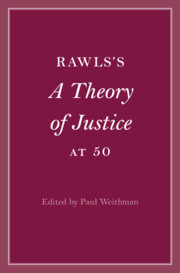Book contents
- Rawls’s A Theory of Justice at 50
- Cambridge Philosophical Anniversaries
- Rawls’s A Theory of Justice at 50
- Copyright page
- Dedication
- Contents
- Figures
- Contributors
- Acknowledgments
- Abbreviations of and Bibliographic Information for Rawls’s Works
- Introduction
- Part I Rawls and History
- Part II Developments between A Theory of Justice and Political Liberalism
- 6 On Being a “Self-Originating Source of Valid Claims”
- 7 Moral Independence Revisited
- 8 The Method of Insulation
- 9 The Stability or Fragility of Justice
- Part III Rawls, Ideal Theory, and the Persistence of Injustice
- Part IV Pluralism, Democracy, and the Future of Justice as Fairness
- References
- Index
8 - The Method of Insulation
On the Development of Rawls’s Thought after A Theory of Justice
from Part II - Developments between A Theory of Justice and Political Liberalism
Published online by Cambridge University Press: 20 July 2023
- Rawls’s A Theory of Justice at 50
- Cambridge Philosophical Anniversaries
- Rawls’s A Theory of Justice at 50
- Copyright page
- Dedication
- Contents
- Figures
- Contributors
- Acknowledgments
- Abbreviations of and Bibliographic Information for Rawls’s Works
- Introduction
- Part I Rawls and History
- Part II Developments between A Theory of Justice and Political Liberalism
- 6 On Being a “Self-Originating Source of Valid Claims”
- 7 Moral Independence Revisited
- 8 The Method of Insulation
- 9 The Stability or Fragility of Justice
- Part III Rawls, Ideal Theory, and the Persistence of Injustice
- Part IV Pluralism, Democracy, and the Future of Justice as Fairness
- References
- Index
Summary
Suggesting the term of a “method of insulation,” this paper analyzes a development that characterizes Rawls’s thought after the publication of Theory. He sought to strengthen his theory of justice by seemingly weakening it, that is, by reducing its philosophical – and especially metaphysical – core commitments to what is absolutely essential for the theoretical enterprise to be successful, aiming at “doctrinal autonomy” and a “free-standing” conception of justice. In reconstructing the main “declarations of philosophical independence” until Political Liberalism, the major achievements but also the problems of this view are discussed. For there came a point at which the method of insulation endangered rather than strengthened the autonomous normative standing of Rawls’s “political” conception of justice.
Keywords
- Type
- Chapter
- Information
- Rawls’s A Theory of Justice at 50 , pp. 140 - 150Publisher: Cambridge University PressPrint publication year: 2023



